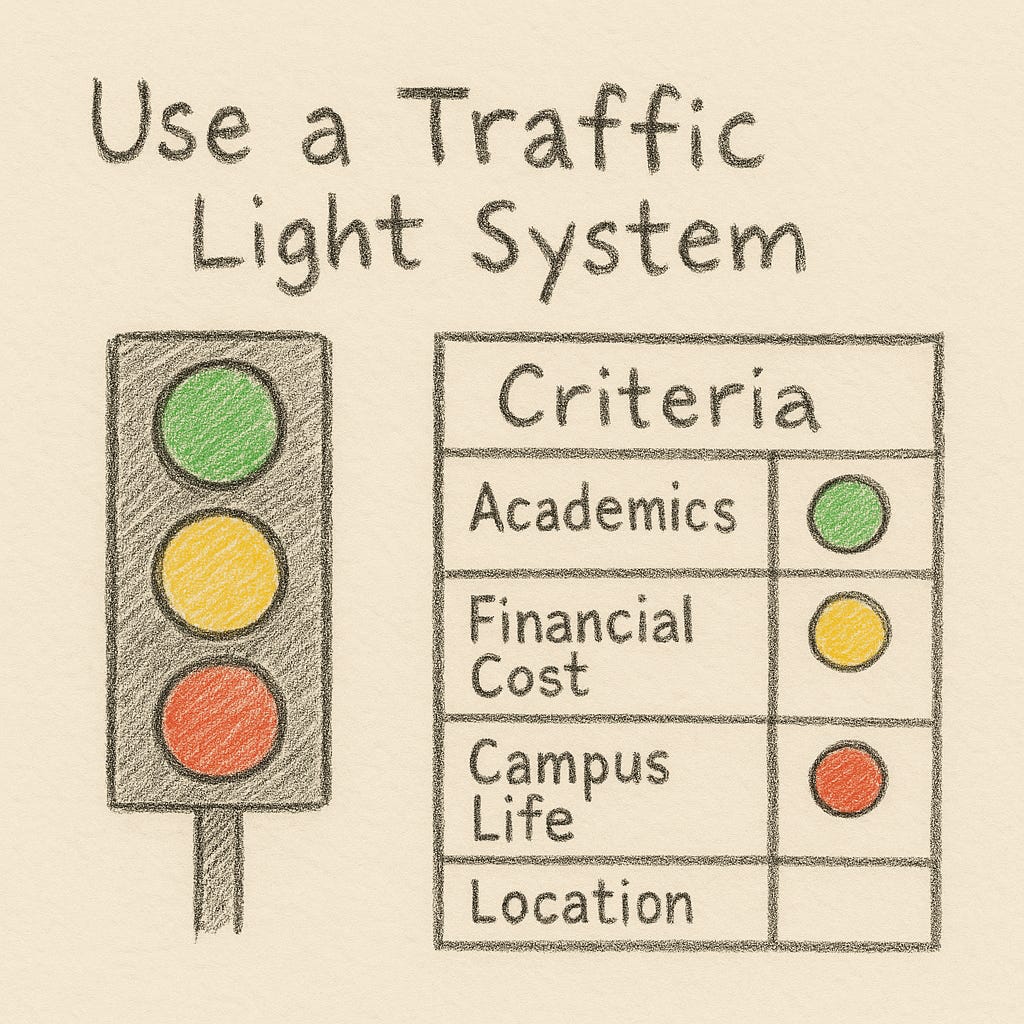Making Your Final College Decision: How to Choose the Right School for You
Five practical methods to confidently choose the right college after acceptance, including evaluating academic fit and course pathways, travel logistics, and intuitive decision-making.
At this time of year, applications are complete, acceptance letters are in, and - if you’re like the students I work with - now you’re facing a big choice: which college to attend.
The truth is that there’s a ton of advice out there on how to get into college, but less on how to actually pick the right one once you have your options.
For some, this decision feels clear and obvious. Or maybe you had a clear favourite from the beginning.
But for many others, choosing can feel incredibly stressful and hard.
Here are five practical methods you can use:
1. A Traffic Light System
Create a simple visual chart by picking 3-5 key factors most important to you—such as academics, financial cost, campus life, athletics, location, or even whether or not you know other people going to that school.
For each college you're considering, rate each factor as:
Green: Great match, feeling confident and comfortable.
Yellow: Neutral feelings or some questions remain.
Red: Concerns, challenges, or just doesn’t feel right.
This visual snapshot helps highlight your best overall fit. It also clearly identifies any red flags you may want to follow-up on.
2. The "10 Things" Exercise
Grab a separate sheet of paper for each college on your shortlist. Quickly jot down the first 10 things that come to mind when thinking about each school. It can be about anything, don't overthink it—this should be spontaneous. When you're done, lay the sheets side-by-side and compare your gut feelings.
You'll likely uncover deeper preferences or concerns that hadn’t surfaced yet.
3. Evaluate Travel Logistics and Costs
It's easy to underestimate the practical realities of travel between college and home, but this matters more than you might think.
Use Google Maps and travel sites to answer:
Is there a direct flight, and how frequent or expensive is it?
Do I have to make multiple hops (change planes, fly+drive, etc…) to get there?
What's the journey like from the airport to campus?
Are there weather or seasonal challenges (mountain passes, snow, delays)?
Travel costs and convenience can significantly impact your college experience over four years.
I used to work with this person who had an interesting rule when evaluating whether or not to hire someone for his team—he called it the middle seat rule. He’d ask: would you fly middle seat on an overnight red-eye just to meet this person and try to sell them on your team?
While maybe a bit extreme… imagine something similar. Would you happily endure a middle seat flight through multiple connections (or overnight) to get to your college? Would you happily endure very long car rides? If not, it’s worth thinking hard about the travel trade-offs.
4. Deep Dive into Your Academic Plan
Many students forget to review the courses they'll actually take each semester.
Dive into the colleges' websites to explore required courses, electives, and opportunities for study abroad, internships, or minors.
Many colleges helpfully map out what the 4-year track looks like, by major. And you would be surprised at just how much this can vary amongst colleges.
Understanding exactly what your academic journey will look like at each college can greatly influence your final decision—especially if flexibility is important to you.
5. Dress Up Test
If you have gear from the schools you're considering (sweatshirts, t-shirts, hats), put them on and stand in front of a mirror.
If you don’t, that’s OK too – just put on gear in the school’s colours.
Take a moment to reflect on how it feels.
This simple yet powerful exercise taps into your intuitive sense of fit and belonging. Does it feel right?
Bonus: Additional Quick Tips
Visit Again: If possible, attend admitted student days or revisit campuses to experience them with fresh eyes. I wrote about admitted student events here.
Talk to Current Students: Get candid feedback about their experiences, likes, and dislikes.
Trust Your Gut: Ultimately, your instincts probably matter than any hard facts. You've done the research—now trust yourself.
Remember, there's no "perfect" choice, but thoughtful reflection ensures that you'll select a school where you’ll be happy, successful, and excited to spend your next four years.


